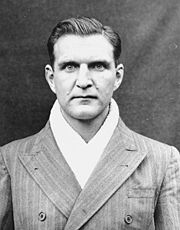
Fritz Fischer (medical doctor)
Encyclopedia

Germany
Germany , officially the Federal Republic of Germany , is a federal parliamentary republic in Europe. The country consists of 16 states while the capital and largest city is Berlin. Germany covers an area of 357,021 km2 and has a largely temperate seasonal climate...
medical doctor who, under the Nazi regime
Nazi Germany
Nazi Germany , also known as the Third Reich , but officially called German Reich from 1933 to 1943 and Greater German Reich from 26 June 1943 onward, is the name commonly used to refer to the state of Germany from 1933 to 1945, when it was a totalitarian dictatorship ruled by...
, participated in "medical experiments
Nazi human experimentation
Nazi human experimentation was a series of medical experiments on large numbers of prisoners by the Nazi German regime in its concentration camps mainly in the early 1940s, during World War II and the Holocaust. Prisoners were coerced into participating: they did not willingly volunteer and there...
" conducted on inmates of the Ravensbrück concentration camp
Ravensbrück concentration camp
Ravensbrück was a notorious women's concentration camp during World War II, located in northern Germany, 90 km north of Berlin at a site near the village of Ravensbrück ....
.
Fischer was born in Berlin
Berlin
Berlin is the capital city of Germany and is one of the 16 states of Germany. With a population of 3.45 million people, Berlin is Germany's largest city. It is the second most populous city proper and the seventh most populous urban area in the European Union...
. He studied medicine
Medicine
Medicine is the science and art of healing. It encompasses a variety of health care practices evolved to maintain and restore health by the prevention and treatment of illness....
first at Bonn
Bonn
Bonn is the 19th largest city in Germany. Located in the Cologne/Bonn Region, about 25 kilometres south of Cologne on the river Rhine in the State of North Rhine-Westphalia, it was the capital of West Germany from 1949 to 1990 and the official seat of government of united Germany from 1990 to 1999....
, later at Berlin and Leipzig
Leipzig
Leipzig Leipzig has always been a trade city, situated during the time of the Holy Roman Empire at the intersection of the Via Regia and Via Imperii, two important trade routes. At one time, Leipzig was one of the major European centres of learning and culture in fields such as music and publishing...
, and finally graduated in Hamburg
Hamburg
-History:The first historic name for the city was, according to Claudius Ptolemy's reports, Treva.But the city takes its modern name, Hamburg, from the first permanent building on the site, a castle whose construction was ordered by the Emperor Charlemagne in AD 808...
in 1938. He joined the SS in 1934 and became a member of the NSDAP in June 1937. On 1 November 1939, he was assigned to the Waffen-SS
Waffen-SS
The Waffen-SS was a multi-ethnic and multi-national military force of the Third Reich. It constituted the armed wing of the Schutzstaffel or SS, an organ of the Nazi Party. The Waffen-SS saw action throughout World War II and grew from three regiments to over 38 divisions, and served alongside...
of the SS-Department of the Hohenlychen Sanatorium as a physician and SS Second Lieutenant.
In 1940, he became troop physician of the SS Division Leibstandarte Adolf Hitler. After having been wounded he was posted back to Hohenlychen and worked in the camp hospital of the Ravensbrück concentration camp
Ravensbrück concentration camp
Ravensbrück was a notorious women's concentration camp during World War II, located in northern Germany, 90 km north of Berlin at a site near the village of Ravensbrück ....
as a surgical assistant to Karl Gebhardt
Karl Gebhardt
Karl Gebhardt was a German medical doctor; personal physician of Heinrich Himmler; and one of the main coordinators and perpetrators of surgical experiments performed on inmates of the concentration camps at Ravensbrück and Auschwitz.-Career in the Third Reich:Gebhardt's Nazi career began with his...
. He participated in the surgical experiments carried out on concentration camp inmates there.
After World War II
World War II
World War II, or the Second World War , was a global conflict lasting from 1939 to 1945, involving most of the world's nations—including all of the great powers—eventually forming two opposing military alliances: the Allies and the Axis...
, he was tried in the Doctors' Trial
Doctors' Trial
The Doctors' Trial was the first of 12 trials for war crimes that the United States authorities held in their occupation zone in Nuremberg, Germany after the end of World War II. These trials were held before U.S...
in Nuremberg
Nuremberg
Nuremberg[p] is a city in the German state of Bavaria, in the administrative region of Middle Franconia. Situated on the Pegnitz river and the Rhine–Main–Danube Canal, it is located about north of Munich and is Franconia's largest city. The population is 505,664...
and was condemned to life imprisonment. His sentence was reduced to 15 years in 1951 and he was released in March 1954. Fischer subsequently returned his license to practice medicine and started a new career at the chemical company Böhringer in Ingelheim, where he stayed until his retirement.
Further reading
- Klier, F.: Die Kaninchen von Ravensbrück. Medizinische Versuche an Frauen in der NS-Zeit.; Droemer Verlag, Munich 1994, ISBN 3-426-77162-4.

